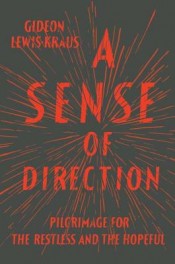Title: A Sense of Direction: Pilgrimage for the Restless and the Hopeful
Author: Gideon Lewis-Kraus
Genre: Memoir
Year: 2012
Publisher: Riverhead Hardcover
Acquired: From the publisher for review consideration
Rating: 




Summary: In medieval times, a pilgrimage gave the average Joe his only break from the daily grind. For Gideon Lewis-Kraus, it promises a different kind of escape. Determined to avoid the kind of constraint that kept his father, a gay rabbi, closeted until midlife, he has moved to anything-goes Berlin. But the surfeit of freedom there has begun to paralyze him, and when a friend extends a drunken invitation to join him on an ancient pilgrimage route across Spain, he grabs his sneakers, glad of the chance to be committed to something and someone.
… Across three pilgrimages and many hundreds of miles — the thousand-year-old Camino de Santiago, a solo circuit of eighty-eight Buddhist temples on the Japanese island of Shikoku, and, together with his father and brother, an annual mass migration to the tomb of a famous Hasidic mystic in the Ukraine — he completes an idiosyncratic odyssey to the heart of a family mystery and a human dilemma: How do we come to terms with what has been and what is — and find a way forward, with purpose? (Source)
Long Review: A Sense of Direction is a book moving forward along two paths. The first is an introspective story about Lewis-Kraus’ experience of walking the three pilgrimages and the lessons he learns along the way. That’s a rather simplified explanation of the journey, which explores his relationships with friends and family and the lessons he gleans from his time performing “exercises in pointless austere motion.”
The second narrative path (which I must admit I found much more interesting) was Lewis-Kraus’ academic research into the idea of pilgrimage and why, over the centuries, people have decided to take these types of physically grueling and emotionally draining walks along various spiritual paths. A pilgrimage has never been for the faint of heart — even if the pilgrim has little idea why he or she is trying to accomplish.
I suppose it’s clear by now that I had some mixed feelings about A Sense of Direction. On the one hand, I loved the way Lewis-Kraus used his journey’s to explore big questions about connection and family and learning to live a life with purpose. He’s clearly an intelligent and thoughtful guy, and the way he worked through these questions kept me reading because I wanted to hear what he would discover. And his conclusions about how to “escape the anxiety of novelty with the guarantees of obligation” felt both counter-intuitive and entirely obvious.
At the same time, there was something oddly performance-like about the book. This seems like a strange critique, given that I’m such a fan of stunt memoirs, but there is it. The book read, to me, as if about part way through the first pilgrimage, Lewis-Kraus decided this would be a good book, then continued on his two other big walks to finish the story he got the idea to tell. I think I may have been more satisfied with the book if Lewis-Kraus had stopped after his first or second pilgrimage. I understand the purpose of the third, and the way it brings the reason he decides to go on these walks — working through his relationship with his father and what his father’s life has taught him — but it also felt forced.
I’m glad I read the book. One of the ideas that stuck with me since I finished is a question of how much freedom is a good thing. Does living a life with no obligations really make us free, or do our obligations give us a sense of how to move forward and feel satisfied with who we are and the life we are leading? The book is full of big, good questions, and reading A Sense of Direction helped me consider them in a new way, even if I wasn’t entirely satisfied with the path the book took me along.
Other Reviews: Forever Overhead |
If you have reviewed this book, please leave a link to the review in the comments and I will add your review to the main post. All I ask is for you to do the same to mine — thanks!


Comments on this entry are closed.
I love stunt memoirs too so I’m disappointed to see you didn’t love this book.
I’m not sure I’d necessarily call this one a stunt memoir, although there was definitely a sort of performative aspect to it. I wish I had loved it more 🙂
I enjoy memoirs, and this one sounds intriguing on several levels, especially since I’m a bit of a history and movie buff. It’s a shame this book didn’t really work for you.
There’s a lot of fascinating history in this one that I enjoyed a lot.
That’s too bad you didn’t like the book. I really enjoyed my experience with it. I thought he was pretty transparent regarding his motives through the course of the narrative, so that didn’t bother me. I likes how he didn’t pull punches against himself and was willing to allow himself look like an ass. Anyway, I reviewed the book here: http://www.4everoverhead.com/2012/06/review-sense-of-direction-by-gideon.html
That’s definitely true — he doesn’t sugar coat his own behavior or motives, which is nice (but also a little hard to read, at times).